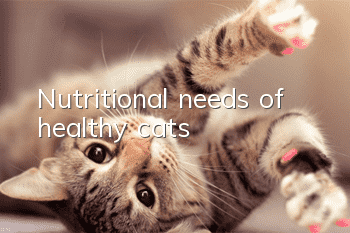Nutritional needs of healthy cats

In addition to providing a good living environment for a healthy cat, a healthy diet is also crucial. The nutrients a cat needs during its growth and development include protein, carbohydrates, fats, vitamins and minerals. Materials, water, etc. are roughly the same as those of other animals, but the proportions of nutrients are different.
1. Protein: Protein is the material basis for body growth and development and tissue repair. Various meats, eggs, milk, fish foods and animal offal are rich in protein. Adult cats have a daily protein requirement per kilogram of body weight. The protein requirement of the baby is about 2 to 3 grams, and the protein requirement will increase during the growth and development period and lactation period. In addition, protein quality is also important in cat food. Only those proteins that are digested and absorbed by the body have certain nutritional value. Of course, feeding cats more protein is not always better. Excessive protein will not only increase the burden on the liver and kidneys, but may also lead to a decline in the cat's physical fitness and create conditions for the invasion of diseases.
2. Carbohydrates: Carbohydrates include starch and cellulose, the former can be converted into sugar in the body. Provides the energy needed by the body, which can promote gastrointestinal motility. Cats can fully digest and absorb the starch in corn and wheat. The cooked rice is delicious and cute for cats. These foods can be used as the main part of cat food, and then other nutrients can be added on this basis. Cats like dry food, so avoid adding too much water to the food to make it liquid.
3. Fat: Fat is a high-energy substance that can produce a large amount of energy after eating, promote the absorption and utilization of fat-soluble vitamins, and make the cat's coat smooth and smooth. The lack of fat in the food can lead to an increase in cat dander and affect the cat's reproductive development. Adult cats require about 1 gram of digestible fat per kilogram of body weight per day. Excessive consumption of fat will make cats obese and cause nutritional and metabolic disorders, such as yellow fat disease, adipose tissue inflammation, etc.
4. Vitamins: Although the body's demand for vitamins is small, their physiological functions are great. They mainly control and regulate the body's metabolism. There are many types of vitamins, which can be divided into water-soluble vitamins A, D, E, K and fat-soluble vitamins B and C according to their solubility. Various vitamin deficiencies will cause different symptoms and affect the normal growth and development of cats. But generally speaking, as long as the cat is provided with sufficient protein and fat and the feeding is reasonable, vitamin deficiency will not occur.
5. Minerals: The minerals needed by the body mainly include calcium, phosphorus, sodium, ammonia, potassium, magnesium, iron, copper, iodine, manganese, zinc, cobalt, etc. They are the main components of animal tissue cells, the basic substances for maintaining acid-base and osmotic pressure, and are also the main components of many coenzymes and prosthetic groups. Minerals are very important for the growth and development of cats. Once lacking, it will cause anorexia, vomiting, diarrhea, rickets, slow growth, sparse coat, miscarriage, dystocia, etc. in cats. When cats have various symptoms due to mineral deficiency, treatment and scientific diet are very important. Pacific LifeEngineering (Wuhan) Co., Ltd. imported mineral plant-based nutritional health powder specially developed for pets from a certain place, which has no toxic or side effects on the body (an acute toxicity test report from the Hubei Provincial Center for Disease Control and Prevention has been obtained, please browse the "Experimental Report" "column), you only need to mix 0.6 grams of powder or 1 ml of pet-specific HB-101 liquid into cat food every day to meet the various minerals and trace elements needed by the body, ensure the health of cats, improve immunity, and resist disease. ability.
The last thing that needs to be talked about is water. Cats are more resistant to thirst, but water is also an indispensable substance in cats’ lives. Water can regulate metabolism and affect growth and development. Water helps in the transportation, digestion, and absorption of nutrients, the elimination of metabolic waste, and the regulation of body temperature. Endocrine regulation is also inseparable from the participation of water. Adult cats need 40 to 60 ml of water per kilogram of body weight per day, and kittens need 60 to 80 ml of water per kilogram of body weight per day. Nursing cats require more water. As cats age, their water intake decreases. If a cat drinks too much water, nephritis, diabetes, etc. should be considered. Adding 0.5 to 1 ml of HB-101 to the cat's drinking water container every day can ensure a healthy life for the cat. Its effect is to make it less likely to get sick and get lice.
- Why does the kitten keep sneezing?
- How do cats communicate with each other?
- Cat vomited a puddle of yellow water after eating cat grass
- Why does the cat keep meowing?
- How often should cats be dewormed?
- Be careful of cats biting people in the following three situations:
- Where is the best place to put the litter box after raising a cat?
- How to treat kitten catitis?
- How to keep your cat warm when it’s cold at home
- How to clean your cat's tail?



